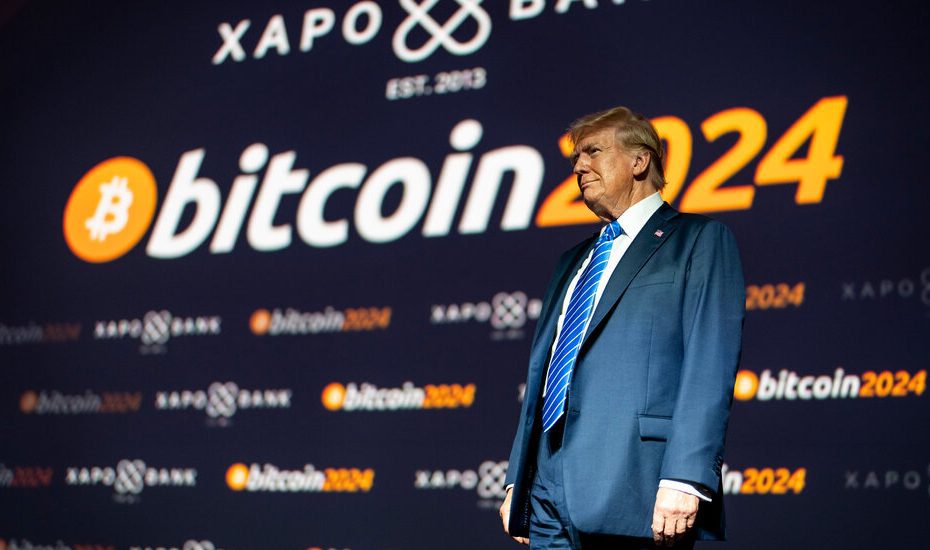President Trump issued an executive order on Thursday to support the growth of the cryptocurrency industry, in which he called for a new plan to regulate a company in which he has significant personal investments.
The Implementation Decree, which contained few details, said that the Trump government would set up a working group for digital assets to come up with a comprehensive plan, including 'regulatory and legislative proposals'. The group would also consider constructing a national stock of cryptocurrency, according to the order – a stock of digital coins controlled by the government for which industry lobed the new government for months to create it.
“The digital asset industry plays a crucial role in innovation and economic development in the United States, as well as in the international leadership of our country,” said the order. “It is therefore the policy of my government to support the responsible growth and use of digital assets.”
Mr. Trump has a considerable personal interest in the success of the crypto industry. He and his sons helped last year with the setting up of a crypto company called World Liberty Financial, which sells a new digital currency called WLFI. This month he and his wife Melania each started selling memecoins, a kind of cryptocurrency inspired by an online joke or mascot of a celebrity.
The companies have received criticism from ethical experts who are concerned about conflicts of interest. In fact, Mr Trump tries to write the rules for business companies that he can benefit personally. He has sworn to put an end to the legal action of the Bides against crypto companies and has made a series of personnel selections at important federal authorities that seem to be ready to increase the prospects of the crypto industry.
In the Implementation Decree, Mr Trump said that his government has committed itself to 'protect and promoting' the crypto industry. He promised 'fair and open access to banking services', a response to complaints from crypto companies that banks have refused their bills. And shortly after the order was issued, the Securities and Exchange Commission reversed the accounting guidelines that banks had prevented from becoming involved in Crypto.
Yet Mr. Trump's actions did not go as far as many had hoped in the crypto industry. He did not order federal authorities to drop lawsuits against crypto companies, nor did he order the government to buy Bitcoin.
One of the more substantive elements of the order is a ban on the creation of a 'digital currency of the central bank', a kind of cryptocurrency on which the government supervises. Many crypto enthusiasts are on ideological grounds against the creation of such currency, and Mr Trump sworn to forbid it during his campaign.
But in an analysis of the order, Molly White, a crypto investigator, noted that no federal body has ever seriously pursued to create such a cryptocurrency. Mrs White called the command of Mr Trump “mainly symbolic.”
Trump was once a skeptic who drove Bitcoin as a scam and became a distinct enthusiast of digital currency during his campaign, while the crypto industry stuck more than 130 million dollars in high-profile congress races. At a Bitcoin conference in July, Mr. Trump promised that he would turn the United States into the 'Cryptoh capital of the planet'.
Subsequently, the Trump family started World Liberty Financial in September, which they brought on the market as a platform to facilitate borrowing and lending in digital currencies. Mr. Trump is not a direct owner of World Liberty Financial, but he receives part of the sale of WLFI, the cryptocurrency that is linked to the platform.
Since his election, Mr. Trump has taken steps to reform the regulatory authorities that challenged crypto companies during the Bides government. In December he chose a new chairman of the SEC, who worked closely with crypto companies. And he called in the venture investor and enthusiast of digital currency David Sacks to supervise the policy of his government in the field of artificial intelligence and crypto.
But Trumps most aggressive trip to the Cryptomarkt took place on Friday evening, when he announced a memecoin with the name $ Trump. The sale of the cryptocurrency rose immediately, so that dozens of billions of dollars were added to Trump's ability, at least on paper. The price collapsed two days later, after Melania Trump announced that she also offered a Memecoin.
The episode caused indignation among crypto traders who said they felt burned by the successive announcements and chaotic price movements. But the industry still has high expectations of the Trump government. Crypto leaders have lobbyed him for months, hoping to secure his support for legislation that would discourage the SEC and increase the prices of the leading digital currency.
Hours before Trump's inauguration on Monday, the price of Bitcoin rose to a record of more than $ 109,000, while crypto supporters celebrated the rise of a man they describe as the first 'Bitcoin president'.

